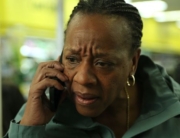Director Nathalie Álvarez Mesén has set herself an imposing task with her debut film: conveying the complexity of 40-year-old Clara—who lives on a rural Costa Rican farm with her domineering mother, Fresia (Flor María Vargas Chaves), and teenage niece, Mariá (Ana Julia Porras Espinoza)—without resorting to histrionics or melodrama.
Clara is considered by the locals in the village to be a healer, who uses the guidance and intercession of the Virgin Mary (who, it is said, once appeared to her) to help others. Yet at home with her mother and niece, Clara is considered to be child-like, especially by Fresia, who uses every opportunity to cut her daughter off from any seeming normality in her life (there are even markers, ribbons of purple fabric, in the house and on the family’s property that mark the boundaries where she can roam).
Clara’s physical health requires her to wear a corset; her hunchbacked walk stems from a spinal curvature that’s getting worse. However, Fresia refuses to consider surgery to correct it, even though it would be covered by insurance, because, as she tells a doctor, “God gave her to me like this … she’s different.” So, Clara finds solace in nature, and feels a close bond to the family’s beloved white horse, Yuca. She seems most content when outside, in the woods or near the river, away from others, with only herself and her thoughts. Lying on the grass, with her ear to the ground, she listens for sounds of movement: Earthquake tremors are both natural occurrences and portents of the mystical.
When a horse-wrangler, Santiago (Daniel Castañeda Rincón), arrives on the property, Clara senses something of a shift, but at first cannot quite put her finger on what has changed. Admirably, Álvarez Mesén resists turning Clara Sola into an erotic potboiler, even though the film’s marketing copy suggests that such tension is “igniting a sexual and mystical awakening” in Clara. Indeed, Álvarez Mesén goes in the opposite direction, understatedly and subtly exploring Clara’s spirituality and emotions with a touch of magic realism. (The film is also being marketed as a riff on Stephen King’s horror story Carrie, but that raises images of shrieking, bloodletting, and vengeful mayhem, which the director largely avoids.)
There’s the ghost of the dominant patriarchy in this household, even though we see no men in the family: Clara has been worn down by both her mother and niece. Meanwhile, the preparations for María’s upcoming quinceañera are getting all of the household’s attention, which Clara resents. When Fresia announces that she might sell Yuca to pay for the celebration, that adds further fuel to her resentment.
Meanwhile, Clara’s strong, unexplained connection to Santiago grows, despite the fact that he is much younger and Mariá’s secret boyfriend. He is gentle with Yuca, and speaks to Clara as an equal and not simply as a child or someone “different,” as others do. Their relationship is, at first, tentative—after all, her confused feelings are the kind she’s most likely been repressing for years—but it reaches a climax at Mariá’s party, which leads to an ambiguous ending that includes an earthquake and a fire—all part of Clara’s cherished natural world.
Álvarez Mesén exhibits remarkable control throughout, bookending the film with shots of Clara and Yuca that encompass the immense emotional and physical ground Clara has traveled. Visually, cinematographer Sophie Winqvist Loggins’s intimate handheld camerawork—of the interiors and outside in nature—beautifully conveys the sense of Clara trying to manage the difficult balancing act of living in two worlds, one that has never been kind to her and the other she longs to remain. Similarly, Álvarez Mesén uses Ruben De Gheselle’s quivery violin score smartly and sparingly as it underlines Clara’s deeper relationship with the luminous natural world.
Álvarez Mesén has also cast her film perfectly, especially the role of Clara. It’s not surprising to hear that Wendy Chinchilla Araya, who plays her so exquisitely, is a dancer with no film experience: Araya’s minutest movements say more than dialogue or voice-over would. Álvarez Mesén and Araya have together dynamically breathed life into a woman who finds liberation on her own terms.







Leave A Comment